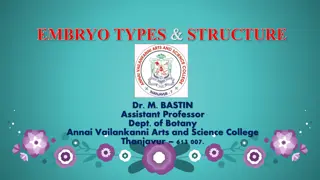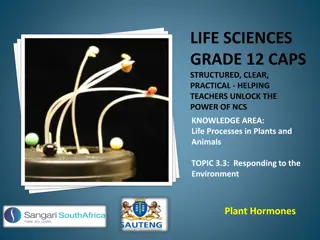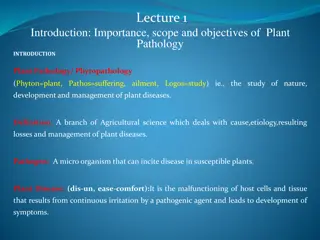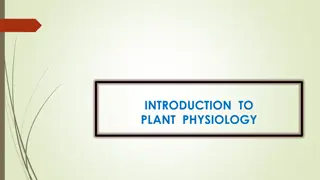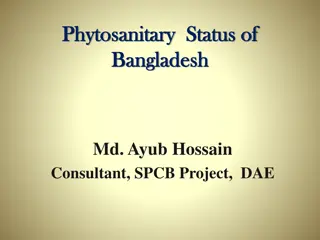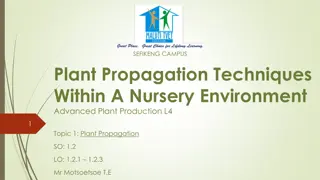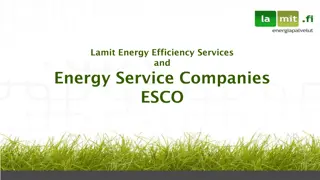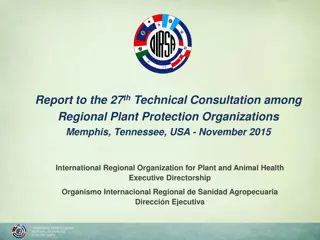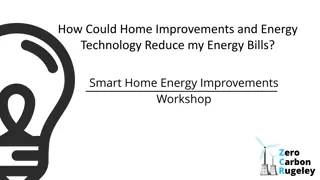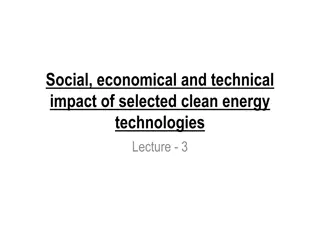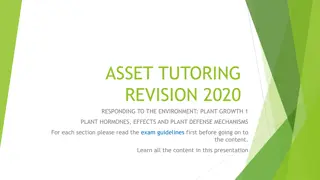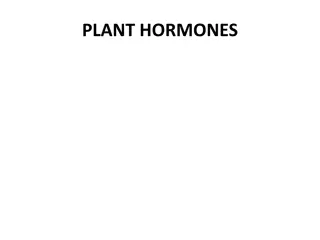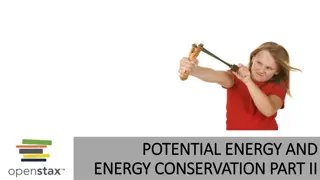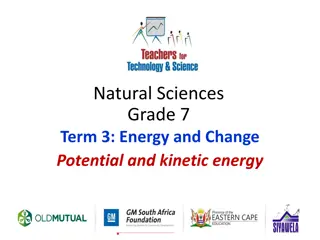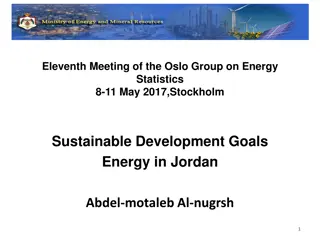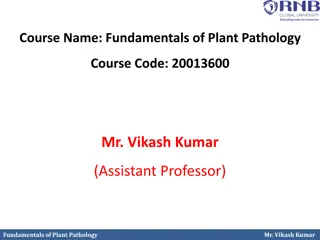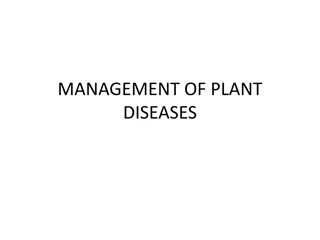Unit 1: Introduction and History of plant pathology
The science of plant pathology, which studies plant diseases and aims to protect the food supply by improving plant survival in unfavorable conditions. Explore the causes of plant diseases, their symptoms, and methods of prevention and control.
5 views • 13 slides
Green Energy Market
Green energy also referred to as clean energy, is usually derived from natural sources that are constantly replenished. Solar energy, wind energy, hydroelectric power, biomass energy, geothermal energy, tidal energy, and wave energy are different types of renewable energy. Solar energy is the radian
6 views • 6 slides
Amway Nutrilite All Plant Protein Powder 1kg Deutsche Post AG
Amway Nutrilite All Plant Protein Powder is a premium source of protein derived from plant-based ingredients. With each serving, you get a blend of high-quality protein to support your active lifestyle and dietary needs.\nAmway Nutrilite All Plant Protein Powder offers a convenient way to supplement
1 views • 4 slides
Comprehensive Overview of Energy Balances in Germany
This material covers various aspects of energy balances in Germany, including components of energy flowcharts, renewable energy sources in the German energy balance, and total final consumption of road transport energy. It provides a detailed analysis of energy imports, domestic extraction, losses,
2 views • 10 slides
EXPLORATION OF ENERGY SAVING OPPORTUNITY AND ENERGY EFFICIENCY IMPROVEMENT THROUGH ENERGY AUDIT: A CASE STUDY OF DVC OWNED POWER PLANT
Dr. Mehebub Alam presented a case study on exploring energy-saving opportunities and improving energy efficiency through an energy audit at a DVC-owned power plant. The audit methodology involved measuring field data, analyzing performance, and assessing overall plant efficiency. Various instruments
5 views • 19 slides
Understanding Energy: Types, Potential, and Kinetic
Dive into the world of energy with a comprehensive guide covering the definition, types, and characteristics of gravitational, potential, and kinetic energy. Explore how energy is the driving force behind all work and movement, with examples and explanations provided for each energy type. Gain insig
2 views • 24 slides
Sustainable Energy Initiatives at Local Level in Lithuania
The National Parliamentary Workshop on Energy Efficiency highlighted the importance of renewable energy development and sustainability at the local level in Lithuania. Initiatives such as the Breakthrough package and Renewable Energy Communities aim to improve energy efficiency, reduce energy povert
2 views • 12 slides
Understanding Plant Embryogenesis: A Comprehensive Overview
Plant embryogenesis is a crucial process in the development of plant embryos from fertilized ovules, involving cell division, differentiation, and morphogenesis. This process leads to the formation of seeds, which play a vital role in the plant life cycle. The stages of embryo formation, structure,
0 views • 25 slides
Understanding Plant Tissue Culture: Methods and Requirements
Plant tissue culture involves the in-vitro culture of plant explants under aseptic conditions, covering cell, organ, and suspension cultures. This process, pioneered by German botanist Gottlieb Haberlandt, relies on the totipotency of plant cells. Key requirements include laboratory organization, su
0 views • 18 slides
Understanding Plant Hormones and Their Functions in Plants
Plant hormones play crucial roles in various plant processes such as growth, development, and response to environmental stimuli. Auxins, gibberellins, and abscisic acid are key plant hormones that regulate tropisms, cell division, elongation, flowering, seed germination, and dormancy. Understanding
1 views • 50 slides
Exploring Energy Stores and Transfers in Science Lessons
Dive into the fascinating world of energy stores and transfers through engaging science lessons. Recall different energy stores, common energy transfers, and create flow diagrams to illustrate energy transfers in various scenarios. Explore gravitational, elastic, magnetic, electrostatic potential en
5 views • 9 slides
Understanding Plant Tissue Culture Media and Their Importance in In Vitro Growth
Plant tissue culture media play a crucial role in the in vitro growth and morphogenesis of plant tissues. The composition of culture media depends on the specific plant species and the type of material used for culture. Various types of media, such as White's medium, MS medium, B5 medium, N6 medium,
0 views • 6 slides
Energy Assistance Workshop Series Statewide Assessment
The Energy Assistance Workshop Series conducted a statewide assessment to understand energy burden and discuss utility energy assistance programs. The goal was to evaluate the effectiveness of mechanisms for energy assistance to prioritize households with higher energy burdens. The workshops aimed t
0 views • 26 slides
Understanding Energy Transformation in the Natural World
Energy transformation occurs continuously in various forms around us, following the Law of Conservation of Energy. From thermal to chemical and electromagnetic energy, different types of energy are converted and utilized in everyday processes. Examples include the conversion of thermal energy to ele
0 views • 27 slides
Understanding Energy - Forms, Calculations, and Applications
Explore the concept of energy through various images, including forms of energy, kinetic versus potential energy, and calculations involving kinetic and potential energy. Learn about identifying energy states, calculating kinetic energy, and solving physics problems related to energy transfer. Dive
0 views • 27 slides
Understanding Plant Pathology: Importance, Scope, and Objectives
Plant pathology, also known as phytopathology, is the study of plant diseases and their management. It covers the causes, symptoms, and impact of pathogenic organisms on plants. The field aims to understand the interactions between plants and pathogens, develop control methods, and reduce losses in
0 views • 6 slides
Understanding Energy Transfers with Sankey Diagrams
Sankey diagrams are visual tools that depict energy transfers within a system, offering insights into efficiency and energy distribution. By examining the width of arrows representing energy flow, one can analyze useful and wasted energy outputs. Inefficient systems show a disproportionate amount of
1 views • 9 slides
Introduction to Plant Physiology: Exploring the Functioning of Plants
Plant physiology is a crucial subdiscipline of botany that delves into the processes and functions operating within plants. This field closely examines areas like plant morphology, ecology, cell biology, and genetics, shedding light on vital processes such as photosynthesis, respiration, and more. T
1 views • 7 slides
Understanding Plant Tissue Culture: Techniques and Applications
Plant tissue culture involves maintaining and growing plant cells, tissues, or organs in artificial mediums under controlled conditions. It allows the regeneration of whole plants from small plant parts or cells. Hormones like auxins, cytokinins, and gibberellins are used in the process. Proper envi
3 views • 5 slides
Conducting an Effective School Energy Audit
Performing an energy audit at a school helps in understanding energy usage patterns, identifying areas of waste, and creating energy-saving action plans. The audit involves collecting data, creating switch-off lists, and filling out templates methodically to track energy consumption. It should be do
0 views • 16 slides
Plant Tissue Culture Methods for Growth and Reproduction Study
Plant tissue culture methods such as root tip culture, shoot-tip culture, leaf culture, flower culture, and anther and pollen culture allow for the study of growth, reproduction, and genetic variations in plants. These techniques involve culturing various plant parts under sterile conditions to inve
1 views • 20 slides
Understanding Plant Quarantine and Phytosanitary Measures
Plant quarantine involves efforts to prevent the entry, establishment, or spread of foreign pests through legal restrictions on plant and plant product movement. It is crucial for safeguarding plant health, food production, and ecosystems. Phytosanitary measures aim to ensure the health of plants by
0 views • 33 slides
Understanding Mineral Nutrition in Plants
Mineral nutrition in plants involves the acquisition of essential elements in the form of inorganic ions from soil, followed by their absorption and utilization in various plant processes. Around 60 different elements have been reported in plants, with 30 being essential for plant growth. These esse
0 views • 39 slides
Plant Propagation Techniques in Nursery Environment
Learn about plant propagation techniques within a nursery environment, including nursery operations, potting seedlings, plant protection, weed control, packing of nursery plants, and crafting tissues for plant growth. Explore the essential tasks involved in nurturing seedlings and trees before they
0 views • 17 slides
Understanding Different Forms of Energy and Work in Physics
Energy in physics is the capacity to do work, and there are various forms of energy such as radiant energy, kinetic energy, gravitational potential energy, elastic potential energy, chemical potential energy, nuclear potential energy, electrical potential energy, thermal energy, and sound energy. Ea
0 views • 47 slides
Understanding Energy Service Companies (ESCOs) and Their Role in Energy Efficiency
Energy Service Companies (ESCOs) like Lamit offer a range of energy services, from implementing energy-efficiency projects to renewable energy solutions. These companies work as long-term energy management partners, focusing on understanding customer needs, providing energy-saving solutions, and gua
2 views • 18 slides
Overview of Energy Policy and Compliance with EU Directives in Georgia
Ministry of Energy in Georgia focuses on strategic directions for energy policy in alignment with EU directives. The Energy Strategy, Covenant of Mayors, and National Energy Efficiency Action Plan are key initiatives promoting energy efficiency and renewable energy. Projects include consultancy on s
0 views • 10 slides
Plant Health Initiatives at the 27th Technical Consultation Among Regional Plant Protection Organizations - Memphis, Tennessee
The 27th Technical Consultation in Memphis, Tennessee focused on plant health initiatives by the International Regional Organization for Plant and Animal Health. OIRSA emphasized four key technical areas: plant health, animal health, agricultural quarantine, and food safety. Projects included addres
0 views • 13 slides
Exploring Home Energy Improvements and Smart Technology for Energy Efficiency
Discover how home improvements and energy technology can significantly reduce energy bills. Join the Smart Home Energy Improvements Workshop in Zero Carbon Rugeley to explore approaches for sustainable energy production and usage at home. Learn about retrofitting, smart energy systems, and meet char
0 views • 20 slides
Social, Economical, and Technical Impact of Clean Energy Technologies
This course covers the management of micro-level clean energy projects, emphasizing the social, economic, and technical impacts of selected clean energy technologies. It discusses project organization, tools, project life cycle, financial analysis, barriers, capacity building, and more. It delves in
0 views • 32 slides
Plant Growth Hormones and Defense Mechanisms: Understanding Plant Responses to the Environment
Plant growth hormones and defense mechanisms play crucial roles in how plants respond to environmental stimuli such as water, sunlight, gravity, and more. From auxins promoting cell growth to gibberellins stimulating flowering, this presentation educates on the intricacies of plant hormones and thei
1 views • 13 slides
Understanding Plant Hormones and Their Role in Growth and Development
Plant hormones are vital compounds that regulate various processes in plant growth and development. They are mostly organic and can be gases. These hormones are produced in one part of the plant and transported to other parts where they induce physiological effects. The main phytohormones include Au
0 views • 125 slides
Understanding Energy Basics: Temperature, Heat, and Transfer
Explore the fundamental concepts of energy, including temperature, heat, and energy transfer. Learn how temperature differs from heat, how they are measured, and the relationship between thermal energy and water volume. Discover the role of chemical energy and sound energy, and how energy is transfo
0 views • 12 slides
Understanding Elastic Potential Energy and Energy Conservation Principles
Elastic potential energy is stored in elastic bodies like springs and is vital in understanding energy conservation principles. This energy can be calculated using the work done by an ideal spring on a block. By applying elastic potential energy concepts, one can analyze scenarios where a spring sys
0 views • 9 slides
Understanding Energy: Potential and Kinetic Forms in Grade 7 Natural Sciences
Energy in various forms is explored in Grade 7 Natural Sciences, with a focus on potential and kinetic energy. Energy is the ability to do work and exists in different types like heat, chemical, electromagnetic, nuclear, and mechanical. The sun serves as a primary energy source. Potential energy is
0 views • 11 slides
Energy Strategy and Challenges in Jordan: Towards Sustainable Development
The Eleventh Meeting of the Oslo Group on Energy Statistics discussed the energy sector in Jordan, highlighting challenges such as population growth, energy demand, and high energy costs. Jordan aims to diversify energy resources, reduce oil dependency, and enhance environmental protection through i
0 views • 34 slides
Exploring the Fundamentals of Plant Pathology: Understanding Viruses in Plant Diseases
Delve into the world of plant pathology with Mr. Vikash Kumar, as you learn about the nature, structure, and transmission of viruses affecting plants. Explore the important characteristics of plant viruses, their unique properties, and how they interact within plant cells. Gain insights into viral d
0 views • 14 slides
Overview of Plant Quarantine and Disease Management
Plant quarantine is a crucial practice that involves regulating the movement of plants and plant products to prevent the spread of pests and diseases. Originating with the first law in France in 1860, plant quarantine now encompasses various methods such as embargoes and inspections to safeguard pla
0 views • 11 slides
Exploring Turgor Pressure and Energy Concepts in Plant Biology
Delve into the world of turgor pressure and energy dynamics in plants through engaging activities such as the Toothpick Turgor Pressure Lab and Roller Coaster Project. Learn to differentiate potential and kinetic energy, investigate forces affecting motion, and compare potential and kinetic energy i
0 views • 8 slides
Energy Saving Agreements in Lithuania: Legal Framework and Targets
Lithuania's energy saving agreements are guided by a comprehensive legal framework including laws on energy efficiency and methodologies for energy audits. The country has set ambitious energy efficiency targets for 2030, focusing on sectors like building renovation, industry, and household applianc
0 views • 14 slides







